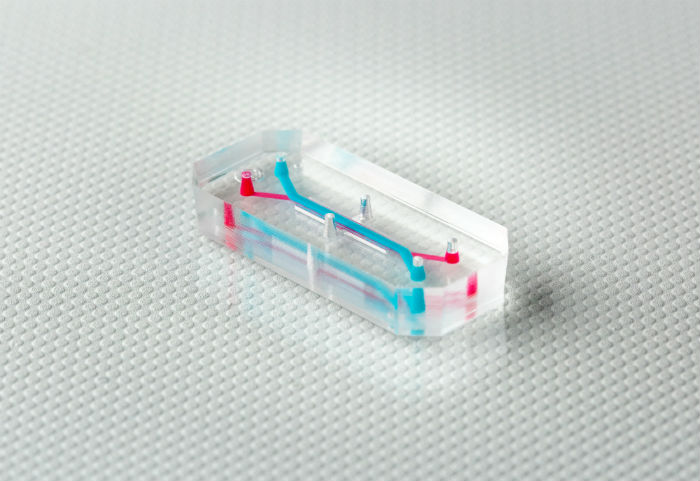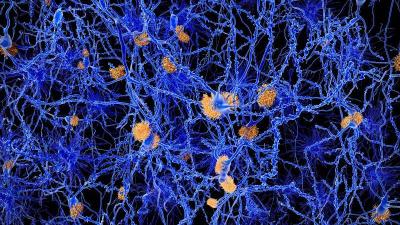Human-Relevant Research Basics: Intestine Chip Models Promise a Better Understanding of Human Disease

The Physicians Committee is posting a series of informative articles to provide readers a more in-depth understanding of human-relevant research models. This occasional series will provide readers with more information about how new technologies promise to revolutionize scientific research, product testing, and even medical education. Scientists working on these technologies are pioneering a more ethical and effective approach—and we can’t wait to tell you more.
Is the Pepto-Bismol theme song the anthem to your life? You aren’t alone! Digestive diseases affect 25 percent of the United States population, yet there are few treatments available to help. The human intestine-on-a-chip (Intestine-Chip) technology may help ease your gastrointestinal (GI) system by revolutionizing our understanding of digestive diseases and paving the way for future treatments.
The gastrointestinal system is responsible for the breakdown of food and liquid into nutrients for the body to absorb and use for energy, growth, and cell repair. The bacteria in the intestine—the gut microbiome—plays an important role in digestion. Microbes aid in the metabolism of food, the production of certain vitamins (like vitamin K), and are essential for immune function and overall health. Many drugs that are ingested orally can affect the delicate equilibrium of the microbiome. An Intestine-Chip model can help illuminate how to protect the microbiome.
Scientists from Cedars-Sinai Medical Center and Emulate, Inc. have bioengineered a new Intestine-Chip. This innovative in vitro (cell culture) model combines the microfluidic organ-on-a-chip technology with organoid-based methods by incorporating human cells onto a microengineered chip about the size of a USB stick. This IntestineChip is created using blood and skin cells that are reprogrammed into induced pluripotent stem cells, which can produce any type of cell. Using special proteins and other substances, the cells are able to generate into organoids or three-dimensional mini organs.
The chips are created by casting an upper and lower layer with microfluidic channels, using a flexible polymer with a silicon membrane in between. The layers are united together using plasma bonding to form the complete chip. The cells are then seeded into the channels to form the intestinal lining. This Intestine-Chip is unique because it can replicate many anatomical functions of the human intestines. It has to ability to simulate physiological fluid flow and peristalsis-like motions, which allow scientists to analyze the intestinal physiology and pathophysiology as they would inside the human body. This chip offers insight into the biological mechanisms of the intestinal epithelium, the layer of cells that forms the lining of both the small and large intestine and which plays a major role in many GI diseases.
The Intestine-Chip‘s ability to accurately replicate the human intestinal epithelium has the potential to drastically improve treatments for the millions of people who suffer from debilitating GI diseases such as Crohn’s Disease, inflammatory bowel disease, and ulcerative colitis. Since these chips can be developed using a person’s own tissue, they have the potential to set a new standard for personalized medicine. Rather than testing numerous drugs on animals, which may be costly and ineffective, or in a living patient, scientists could use a patient’s own cells to develop a personalized Intestine-Chip. Different drugs can then be tested in the chip to determine which treatment is best for each individual patient. This human-relevant system is a promising alternative to unsuitable methods using animals, can be used for drug discovery, and will lead to safer and improved treatments. This is a monumental technology that will improve researchers’ understanding of how medicines, diseases, and foods interact with a person’s microbiome and affect an individual’s health.
Recent news reports indicate that at least two pharmaceutical companies, Roche and Takeda, have partnered with Emulate to use the organ chips in drug discovery and development. Roche will use the chips in place of animals to run drug safety and efficacy tests. Takeda will use the Intestine-Chip to discover and evaluate GI disease drugs and biomarkers.
Link to article: https://www.sciencedirect.com/science/article/pii/S2352345X1730187X
Workman MJ, Gleeson JP, Troisi EJ. Estrada HQ, Kerns SJ, Hinojosa CD, et al. Enhanced utilization of induced pluripotent stem cell-derived human intestinal organoids using microengineered chips. Cellular and Molecular Gastroenterology and Hepatology. 2017. https://doi.org/10.1016/j.jcmgh.2017.12.008







